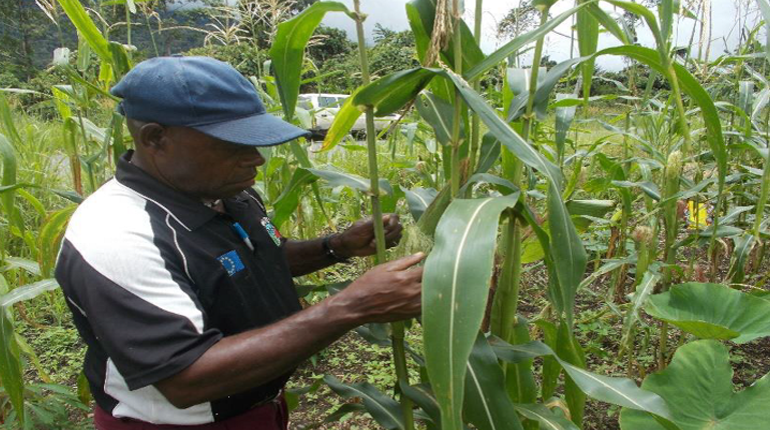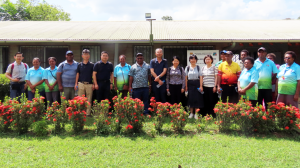There is still plenty of work to do in the field of invasive plants and insects in Papua New Guinea.
These were Pascal Pandau’s parting words when he retired at the age of 62 after serving the National Agricultural Research Institute for over 20 years.
Many young officers who have worked with Mr Pandau regard him as a mentor while others see him as a very reliable and supportive officer.
Mr Pandau does not talk a lot but prefers to do his job without hesitation. Mr Pandau hails from Lumi, Sandaun province, and has been working on pests and invasive plants.
After receiving a fare well gift from NARI, Mr Pandau notes that there is plenty of work and opportunity in the field of invasive plants and pests.
There are very few officers like Mr Pandau who is willing to do more and get the job done on time.
Miriam Simin, a research associate with the Momase Regional Centre at Bubia in Lae, notes that he always carries a notebook when he goes to the field plots.
“He will not leave his note book behind. He will always ensure he keeps a good record when he is out in the field,” Ms Simin explained.
Mr Pandau’s long work history within the agriculture sector especially with NARI is a testament to his commitment and drive to realise positive developments.
Mr Pandau thanked Senior Entomologist Dr Sim Sar, a colleague and mentor with whom he had worked alongside for many years. Dr Sar also retired in late 2020 after more than 20 years of service to NARI.
During the farewell, the Human Resource Talent Development Manager, Roy Gagau, commended Mr Pandau for his years of service and contribution towards agricultural research and development.
Mr Pandau chose agriculture as his career pathway after high school. He began his career in agriculture to study at Popondetta Agriculture College.
He also received training as a cadet from the Department of Agriculture Stock and Fisheries in Port Moresby, and in Fisheries management from the University of Technology. He held various work roles in the early 1980s.
In 1982, his training was put to the test when he was assigned to assist biologists researching biological control for the invasive water hyacinth (Salvinia molesta). This plant, which originated in Brazil, was introduced to the Sepik River in the 1970s.
Salvinia, as it is commonly known for short, blocked more than 500 kilometres of lakes, natural canals and its tributaries, making it difficult and sometimes impossible to access basic services, particularly health services.
In this work, Mr Pandau worked with Samson Laup, who later became the vice chancellor of University of Natural Resources and Environment and assisted other scientists from international organisations to find solutions to the problem.
Together these organisations found a solution and were able to bring the invasive plant under control. Pascal continued this work, assisting in clearing Salvinia from waterways of the Ramu River in Madang and Central province.
In 1992 he transferred to Bubia Research Station. He was fortunate to take the first overseas training on plant protection at Kastertart University, Thailand. His study enabled him to develop a method to control and prevent an outbreak of locusts in the Markham Valley of Morobe province, following the 1997 drought.
He was later assigned to a cadetship training program set up by the then Department of Agriculture, Stock and Fisheries with an East Sepik Rural Development Project. There he worked as a fisheries officer at Pagwi in the Middle Sepik.
After joining NARI, he was involved with insect pests, weed biological control, taro beetle control and NARI’s successful taro breeding program at Bubia.
He shared a lot of information with the community as the main voice on ‘Man on the Land’, a weekly radio program aired on Radio Morobe an initiative of the Information & Knowledge Program, airing agriculture and NARI technology information for several years.
Pascal is happily married to Nela Ongu of Sigaite Village in Lumi, West Sepik and has six children and a handful of grandchildren.

We wish him well in retirement.
 .
.




